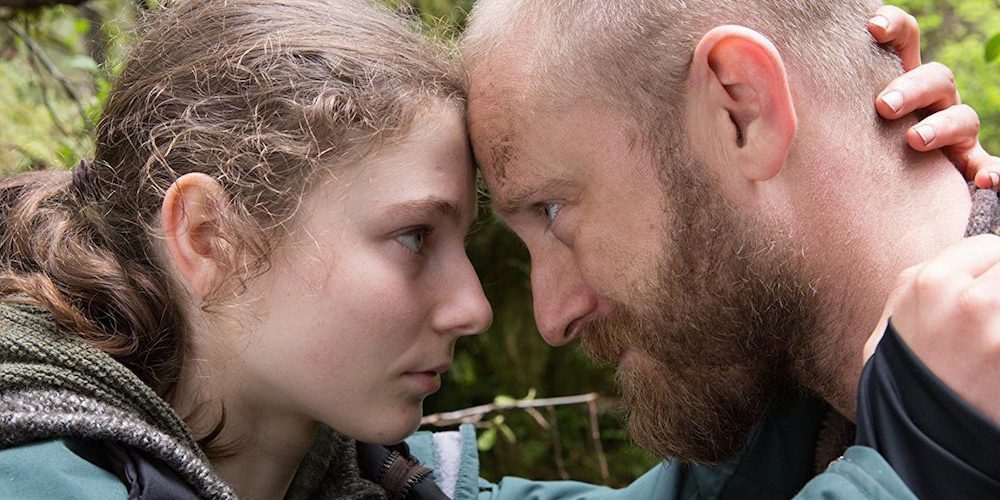Leave No Trace opens quietly, showing us a vast, unblemished wilderness before introducing us to the relatively small human creatures ensconced within. This movie—the third full-length feature film by director and co-writer Debra Granik (Previously responsible for Jennifer Lawrence’s breakout role in 2010’s Winter’s Bone)—remains quiet throughout. It is contemplative, with very little dialogue, reliant on the actors’ facial expressions and the viewer’s ability to read between the lines. But in spite of its reticence, Leave No Trace has quite a bit to say.
Taciturn and rough around the edges, 30-something veteran and widower, Will (Ben Foster), lives a simple existence off the grid alongside his 13-year-old daughter, Tom (Thomasin McKenzie). Using makeshift camps and employing keen survival instincts passed on from father to daughter, Will and Tom have been living deep in the woods of Oregon for an indeterminate amount of time, keeping few possessions and practicing hiding at every sign of outside encroachment. They travel into nearby Portland sparingly and—for Will—reluctantly, to purchase supplies when Tom is hungry and to collect Will’s PTSD medication from the local Veteran’s Affairs office, though it is immediately sold to other squatters for petty cash.
Will and Tom seem to be living a self-sufficient but idyllic existence until Tom is seen by a jogger and social services locates the pair and informs them that it is illegal to live on public land. They spend some time in the system where the extent of Will’s untreated PTSD becomes obvious, though not articulated. Their social worker manages to keep them together and finds a house well outside the city, with a job for Will and material possessions for Tom, but it’s not long before Will is packing up and hauling both of them back into the woods, far from the maddening crowd.
Leave No Trace presents itself as a coming of age tale and it does not disappoint, as young Tom slowly opens up and blossoms, independent of her father, who struggles to bloom in darkness.
When I read about this movie, I’ll admit I expected more rhetoric about the values of living off the land, of being self-sufficient and leaving a small imprint on nature. Due to the sparse dialogue in the film, there was very little talk of why Will chose this life for himself and his young daughter. At first, I found this frustrating; it wasn’t until after that I realized I had misinterpreted the main theme of the film. Leave No Trace is not primarily about minimizing your footprint to preserve nature; it is about the value of community and how easy it is for U.S. military veterans to slip through the cracks.
Throughout the movie, it is made clear that Will has never coped with his past trauma and struggles to connect with the support systems available to him. Despite the fact that father and daughter encounter kindness and encouragement at every turn, Will is still unwilling to adapt to modern life. Though he is capable of supporting himself, for the most part, the key conflict comes when Tom, a growing girl who is starting to form her own thoughts, realizes the hard truths about her father he is unable to articulate. Leave No Trace does an excellent job at showing how broken the support system for veterans is; in spite of every person’s good intention, it still was not enough to reach out and keep this family together.
As Tom learns to first care for her father, then stand up to him, then finally break away from him to take responsibility for herself for the first time, it is a beautiful and heartbreaking story about a child’s compulsory transition into adulthood. Tom has this revelation by attempting to immerse herself in various communities. Through being exposed little by little to social workers, 4H clubs, churches, a kind truck driver, a beekeeper, and a trailer park full of benevolent strangers, Tom teaches herself how to adapt. It is the lessons from her father, though, that keep her strong and sharp. In the end, she must make the choice to break away from him to establish herself as an independent person.
Leave No Trace is not a film for everyone—the long bouts of silence, the laconic nature of father and daughter, and the ambiguous open-ended conclusion can all be understandably off-putting to viewers, but it is a stunning film that may stick with you for some time after it is over.









